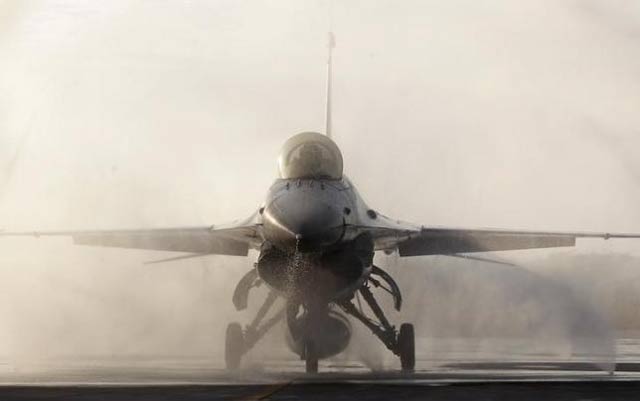
Delivering a policy statement in the upper house of parliament on Thursday after an adjournment motion was moved by Senator Mohsin Leghari and other senators on purchasing eight Lockheed Martin F-16 jets from US, Aziz said that the issue is still under discussion with American authorities and that Islamabad was making strides on multiple fronts to keep the US Administration and members of Congress engaged in a dialogue.
The drop scene of US-Pakistan relations
“While we have already secured approval for the sale, the funding issue is still being discussed as the US Congress has turned down the [Barack Obama] administration’s proposal for using the [Foreign Military Financing ] FMF facility on this count,” he said.

In October 2015, Sartaj said Pakistan reached an understanding with the US to buy eight Block-52 F-16 jets worth $699 million. As per the deal, Pakistan was due to pay $270 million from its national funds while the US would fund the remaining $430 million. While the Congress approved sale of the aircraft, it blocked use of the FMF in late April to finance the deal, leaving Pakistan in the lurch for arranging the full price of the deal.
Pak-US relations — out of balance
Aziz assured the upper house that Pakistan is making all-out efforts to finalise this deal as initially promised by Washington, pointing towards the letter written by the Defence Minister to US Secretary of Defence Ashton Carter last month, and recently statements of the defence secretary in a meeting the commander of the US Central Command General Joseph Votel.
“The US government is cognisant of our requirement and acknowledges the effectiveness of these jets in our war against terrorists,” he said adding that Islamabad aims to take the matter up with the relevant US authorities during the interim progress review meeting of 24th Pakistan-US Defence Consultative Group (DCG) scheduled to be held from May 30 to June 3 in Washington DC.
Aziz said the fundamental objections raised by some US Congressmen, concerning the use of FMF for the deal, are essentially political in nature.
He added that decisions of the US Congress may have been caused by concerns raised by the US on the nuclear issue which was categorically rejected by Pakistan.
“We have also rejected the frequent demand, especially from the US Congress, for the release of Shakil Afridi,” the adviser said.
Afghanistan, Haqqani Network
Aziz said that US officials, Congress, think-tanks and media, in tandem with Pakistan’s adversaries, have been blaming Islamabad for supporting the Haqqani network “without providing any concrete evidence to enable us to take additional action against the HQN or other terrorist organisations.”
He also deplored how recent attacks in Afghanistan and the Taliban spring offensive have further aggravated the bleak security situation in the war-torn country.
Delay in F-16s sale: Defence secretary expresses concern with US commander
The adviser added that in the wake of these attacks, shadows have been cast on the four-nation peace process spearheaded by the Quadrilateral Coordination Group (QCG). Noting that Pakistan has been impressing on Afghanistan and the US to give the reconciliation process a fair chance, he added that related issues will be discussed in the upcoming QCG report scheduled for May 18-19.
Meanwhile, Senate Chairman Raza Rabbani referred the withdrawal of US subsidy for F-16 fighter jets to a joint committee of Senate.
Senator Leghari, who had moved the motion, argued that the F-16 issue was just a tip of the ice-berg.
Published in The Express Tribune, May 13th, 2016.

1725612926-0/Tribune-Pic-(8)1725612926-0-165x106.webp)








1725254039-0/Untitled-design-(24)1725254039-0-270x192.webp)






COMMENTS (19)
Comments are moderated and generally will be posted if they are on-topic and not abusive.
For more information, please see our Comments FAQ